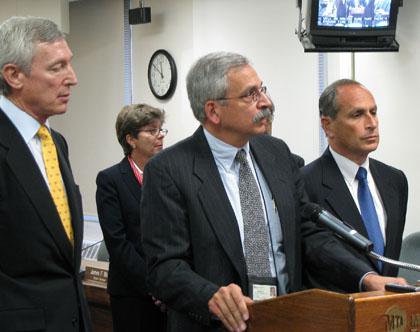By Philip Newman
Transit officials facing monumental debt are looking for ways of saving money and have raised the specter of reduced service on buses, subways and commuter railroads as a last resort.
Meanwhile, the Metropolitan Transportation Authority board last week narrowly approved ending the policy of free E-ZPasses for city employees, including police and firefighters, which the MTA said would save $10 million a year.
Gary Dellaverson, the MTA chief financial officer, has asked heads of MTA divisions to submit revised budgets “in the event either the economy is worse than predicted, which is possible, or assistance from government partners in its entirety is not forthcoming.”
MTA Chief Elliot Sander told the agency's board meeting Sept. 24 that “service cuts are something we have to look at along with other ideas.”
Although public discussions of service cuts have categorized this option as primarily a last resort, Dellaverson at one point recently said MTA divisions might be hard-pressed to deliver cutbacks at the requested level without affecting the service.
Jeremy Soffin, chief MTA spokesman, said talk of service cuts was “all very preliminary.”
In any case, the MTA is in financial straits, with a $900 million deficit expected by early 2009.
Much of the debt is attributed to the fall-off in fees from real estate transactions, which had kept the MTA is good financial shape for several years but shrunk with the collapse of the housing market.
But the MTA had also borrowed $22 billion over the past 10 years for its capital program that involves such major projects as the Second Avenue subway and the East Side Access to bring Long Island Rail Road trains into Grand Central Terminal.
The loans were necessary after the administration of Gov. George Pataki cut off contributions to the capital program and the city sharply reduced its cash outlay.
The MTA had counted on infusions of money from both the state and city, but both say they do not have it to give, particularly in a time of financial peril on Wall Street.
The MTA board voted 7-6 to require city and state vehicles to pay to use MTA bridges and tunnels rather than relying on E-ZPasses, but transit officials said they wanted to make it clear the change would not hinder police or fire vehicles on emergency runs.
State Comptroller Thomas DiNapoli said the MTA “like everyone else, has to learn to do more with less.”
Reach contributing writer Philip Newman by e-mail at news@timesledger.com or by phone at 718-229-0300, Ext. 136.



































